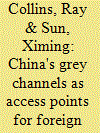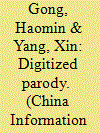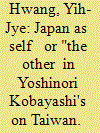|
|
|
Sort Order |
|
|
|
Items / Page
|
|
|
|
|
|
|
| Srl | Item |
| 1 |
ID:
095330


|
|
|
|
|
| Publication |
2010.
|
| Summary/Abstract |
Grey channels, which are neither clearly legal nor clearly illegal, are commonly relied on by international firms as a means of accessing Chinese markets. Firms report that they use grey channels to avoid China's high import tariffs, difficult regulatory hurdles, and inefficient distribution networks. For food products, grey channels involve risks such as unreliability in delivery and inadequate cool chain management, and some authors anticipate that the use of grey channels for such products will diminish when China implements WTO standards. To explore opportunities that may exist in a free trade environment, this article analyzes what a grey channel is, why people use it, how it operates, and what advantages and disadvantages it has in comparison with other channels. This leads to a discussion on the future of grey channels. The analysis is based on in-depth interviews with firms involved in the food trade in China and Hong Kong.
|
|
|
|
|
|
|
|
|
|
|
|
|
|
|
|
| 2 |
ID:
095326


|
|
|
|
|
| Publication |
2010.
|
| Summary/Abstract |
This article investigates egao-technology-enabled online parody in contemporary China. Egao is a site where issues of power struggle, class reconsolidation, social stratification, (online) community formation, and cultural intervention, along with the transformative power of digital technologies, intersect. Through an analysis of Hu Ge's "The Bloody Case of a Steamed Bun," we argue that egao provides an alternative locus of power, permitting the transgression of existing social and cultural hierarchies. Satiric and ludicrous in nature, egao playfully subverts a range of authoritative discourses and provides a vehicle for both comic criticism and emotional catharsis. As an individualized form of expression of the new digital generation, it also offers insight into the collective attitudes of the new class of netizens.
|
|
|
|
|
|
|
|
|
|
|
|
|
|
|
|
| 3 |
ID:
095331


|
|
|
|
|
| Publication |
2010.
|
| Summary/Abstract |
This article is an attempt to demonstrate how and through which social practices Taiwan's past colonial experiences have been discursively produced in a certain way and what other alternatives have been excluded from this process. The article scrutinizes the controversy surrounding a Japanese manga On Taiwan, a book that provides a very positive evaluation of the legacy of Japanese colonialism in Taiwan. Through analyzing statements, utterances, and conducts concerning this manga that were produced by those who have various positions, this article aims to comprehend how the discourses of Japanese colonialism and Sino-chauvinism reciprocally conflict and compete with each other in ways that affect people's self-identification, producing a particular form of subjectivity of Taiwan, while excluding, repressing, and silencing other alternatives.
|
|
|
|
|
|
|
|
|
|
|
|
|
|
|
|
| 4 |
ID:
095329


|
|
|
|
|
| Publication |
2010.
|
| Summary/Abstract |
The improvement of health and safety standards within the organizational context is an important issue of global concern. China's occupational health and safety (OHS) has increasingly drawn national and international attention as it has not kept pace with its globalization of production and trade. The traditional approach to managing workplace safety in China has focused on the technical aspects of engineering systems and processes, and it has attributed the majority of workplace accidents and injuries to unsafe working conditions instead of the unsafe work practices of employees. However, there has been a fundamental shift in the safety management research carried out in many countries and across diverse industries, which aims to measure the impact of attitudinal, organizational, cultural, and social dimensions on occupational safety. This article examines the relationship between safety climate and safety-related behavior in the Chinese context and draws implications for the management of occupational safety in China.
|
|
|
|
|
|
|
|
|
|
|
|
|
|
|
|
|
|
|
|
|